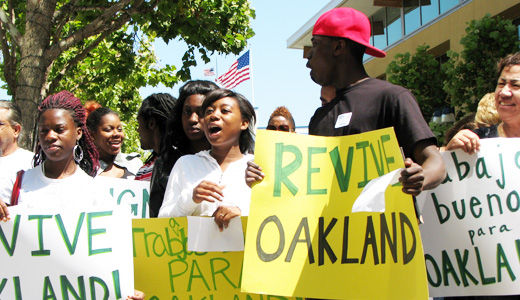
OAKLAND, Calif. – A new chapter opened Feb. 7 in the long saga of efforts to redevelop the former Oakland Army Base, as the City Council approved guiding principles to assure Oakland residents priority for construction jobs and for the warehouse and goods movement jobs that are to follow.
The base is especially important to the city’s economic life because it is next to the Port of Oakland, the nation’s fifth busiest port, in a working-class area where unemployment is high.
Agreement on the provisions came after years of discussion, and a nine-month process that brought together labor, community members, environmentalists and the business community, with Councilmember Jane Brunner playing a major role. Participating in the discussions was the 30-organization Revive Oakland! coalition of clergy, workers, youth, and neighbors from West and East Oakland.
Besides construction jobs, the project is expected to create some 2,500 to 3,000 permanent jobs.
Among the agreed goals: Fifty percent of work hours are to go to Oakland residents, with first priority to residents in West Oakland and other areas of high unemployment. All new apprentices are to be Oakland residents, and a quarter of apprenticeships and later operations jobs are to go to disadvantaged (low income, formerly incarcerated, etc.) workers. Workers are to have the right to organize, free of employer interference.
Many speakers at the City Council meeting cited the importance of the “ban the box” provision, barring prospective employers from asking about an applicant’s prior criminal record.
“I can ride around Oakland, and look at all the work I have done – the Uptown Apartments, the Fox Theater, Kaiser, the airport,” said a young African American woman ironworker. “You’ve got to give people a chance, who have felonies or misdemeanors. I have one. Somebody gave me an opportunity to get a job, and I’ve been doing good for myself for the last eight, nine years. I want to see other people do good for themselves.”
Journeyman electrician Rachel Bryan, who described herself as “a quadruple minority: woman, African American, under 35, disadvantaged worker,” said the goals provide a prevailing wage, benefit the area, level the playing field for local workers, and create a “healthy pathway” for apprenticeships. Citing four Oakland projects she’s worked on, Bryan said, “This has created a deeper appreciation for my city, a deeper level of self-confidence.”
The role of well-paying jobs in lowering crime, in a city where shootings and homicides are a big problem, was also widely mentioned.
“Maybe this will help to stop some of the crime in Oakland,” said longtime West Oakland resident Shirley Burnell. “People would have jobs and would be able to support themselves and their families and they won’t be on the streets robbing people.”
Outside City Hall before the council meeting, two high school students active with the Urban Peace Movement put it another way.
Italia Suarez called the jobs “a means of survival.” Added Jessica Lopez, “Better jobs equal a better life. They’re something to live for instead of becoming another statistic.”
Meanwhile, the city and the developers are working to complete their negotiations in the coming months.
The Oakland Army Base was once a major employer in the area, and when it closed in 1999, it is estimated that as many as 7,000 well-paying jobs were lost.
Photo: Marilyn Bechtel/PW

MOST POPULAR TODAY


Zionist organizations leading campaign to stop ceasefire resolutions in D.C. area

High Court essentially bans demonstrations, freedom of assembly in Deep South

Afghanistan’s socialist years: The promising future killed off by U.S. imperialism

Communist Karol Cariola elected president of Chile’s legislature






Comments